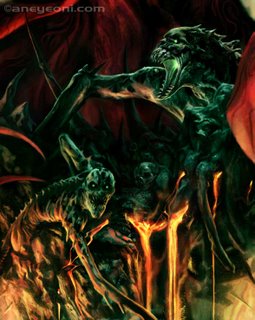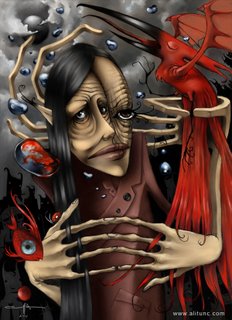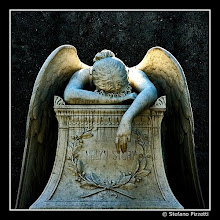From Anton Chekhov "Lights"" The student stood motionless with his hands thrust in his pockets, and did not take his eyes off the lights. He was not listening to the engineer, but was thinking, and was apparently in the mood in which one does not want to speak or to listen. After a prolonged silence he turned to me and said quietly:
"Do you know what those endless lights are like? They make me think of something long dead, that lived thousands of years ago, something like the camps of the Amalekites or the Philistines. It is as though some people of the Old Testament had pitched their camp and were waiting for morning to fight with Saul or David. All that is wanting to complete the illusion is the blare of trumpets and sentries calling to one another in some Ethiopian language."
And, as though of design, the wind fluttered over the line and brought a sound like the clank of weapons. A silence followed. I don't know what the engineer and the student were thinking of, but it seemed to me already that I actually saw before me something long dead and even heard the sentry talking in an unknown tongue. My imagination hastened to picture the tents, the strange people, their clothes, their armour.
"Yes," muttered the student pensively, "once Philistines and Amalekites were living in this world, making wars, playing their part, and now no trace of them remains. So it will be with us. Now we are making a railway, are standing here philosophising, but two thousand years will pass -- and of this embankment and of all those men, asleep after their hard work, not one grain of dust will remain. In reality, it's awful!"
"You must drop those thoughts . . ." said the engineer gravely and admonishingly.
"Why?"
"Because. . . . Thoughts like that are for the end of life, not for the beginning of it. You are too young for them."
"Why so?" repeated the student.
"All these thoughts of the transitoriness, the insignificance and the aimlessness of life, of the inevitability of death, of the shadows of the grave, and so on, all such lofty thoughts, I tell you, my dear fellow, are good and natural in old age when they come as the product of years of inner travail, and are won by suffering and really are intellectual riches; for a youthful brain on the threshold of real life they are simply a calamity! A calamity!" Ananyev repeated with a wave of his hand. "To my mind it is better at your age to have no head on your shoulders at all than to think on these lines. I am speaking seriously, Baron. And I have been meaning to speak to you about it for a long time, for I noticed from the very first day of our acquaintance your partiality for these damnable ideas!"
"Good gracious, why are they damnable?" the student asked with a smile, and from his voice and his face I could see that he asked the question from simple politeness, and that the discussion raised by the engineer did not interest him in the least.
...
Nikolay Anastasyevitch Ananyev, the engineer, was a broad-shouldered, thick-set man, and, judging from his appearance, he had, like Othello, begun the "descent into the vale of years," and was growing rather too stout. He was just at that stage which old match-making women mean when they speak of "a man in the prime of his age," that is, he was neither young nor old, was fond of good fare, good liquor, and praising the past, panted a little as he walked, snored loudly when he was asleep, and in his manner with those surrounding him displayed that calm imperturbable good humour which is always acquired by decent people by the time they have reached the grade of a staff officer and begun to grow stout. His hair and beard were far from being grey, but already, with a condescension of which he was unconscious, he addressed young men as "my dear boy" and felt himself entitled to lecture them good-humouredly about their way of thinking. His movements and his voice were calm, smooth, and self-confident, as they are in a man who is thoroughly well aware that he has got his feet firmly planted on the right road, that he has definite work, a secure living, a settled outlook. . . . His sunburnt, thicknosed face and muscular neck seemed to say: "I am well fed, healthy, satisfied with myself, and the time will come when you young people too, will be wellfed, healthy, and satisfied with yourselves. . . ." He was dressed in a cotton shirt with the collar awry and in full linen trousers thrust into his high boots. From certain trifles, as for instance, from his coloured worsted girdle, his embroidered collar, and the patch on his elbow, I was able to guess that he was married and in all probability tenderly loved by his wife.
Baron Von Schtenberg, a student of the Institute of Transport, was a young man of about three or four and twenty. Only his fair hair and scanty beard, and, perhaps, a certain coarseness and frigidity in his features showed traces of his descent from Barons of the Baltic provinces; everything else -- his name, Mihail Mihailovitch, his religion, his ideas, his manners, and the expression of his face were purely Russian. Wearing, like Ananyev, a cotton shirt and high boots, with his round shoulders, his hair left uncut, and his sunburnt face, he did not look like a student or a Baron, but like an ordinary Russian workman. His words and gestures were few, he drank reluctantly without relish, checked the accounts mechanically, and seemed all the while to be thinking of something else. His movements and voice were calm, and smooth too, but his calmness was of a different kind from the engineer's. His sunburnt, slightly ironical, dreamy face, his eyes which looked up from under his brows, and his whole figure were expressive of spiritual stagnation -- mental sloth. He looked as though it did not matter to him in the least whether the light were burning before him or not, whether the wine were nice or nasty, and whether the accounts he was checking were correct or not. . . . And on his intelligent, calm face I read: "I don't see so far any good in definite work, a secure living, and a settled outlook. It's all nonsense. I was in Petersburg, now I am sitting here in this hut, in the autumn I shall go back to Petersburg, then in the spring here again. . . . What sense there is in all that I don't know, and no one knows. . . . And so it's no use talking about it. . . ."
He listened to the engineer without interest, with the condescending indifference with which cadets in the senior classes listen to an effusive and good-natured old attendant. It seemed as though there were nothing new to him in what the engineer said, and that if he had not himself been too lazy to talk, he would have said something newer and cleverer. Meanwhile Ananyev would not desist. He had by now laid aside his good-humoured, jocose tone and spoke seriously, even with a fervour which was quite out of keeping with his expression of calmness. Apparently he had no distaste for abstract subjects, was fond of them, indeed, but had neither skill nor practice in the handling of them. And this lack of practice was so pronounced in his talk that I did not always grasp his meaning at once.
"I hate those ideas with all my heart!" he said, "I was infected by them myself in my youth, I have not quite got rid of them even now, and I tell you -- perhaps because I am stupid and such thoughts were not the right food for my mind -- they did me nothing but harm. That's easy to understand! Thoughts of the aimlessness of life, of the insignificance and transitoriness of the visible world, Solomon's 'vanity of vanities' have been, and are to this day, the highest and final stage in the realm of thought. The thinker reaches that stage and -- comes to a halt! There is nowhere further to go. The activity of the normal brain is completed with this, and that is natural and in the order of things. Our misfortune is that we begin thinking at that end. What normal people end with we begin with. From the first start, as soon as the brain begins working independently, we mount to the very topmost, final step and refuse to know anything about the steps below."
"What harm is there in that?" said the student.
"But you must understand that it's abnormal," shouted Ananyev, looking at him almost wrathfully. "If we find means of mounting to the topmost step without the help of the lower ones, then the whole long ladder, that is the whole of life, with its colours, sounds, and thoughts, loses all meaning for us. That at your age such reflections are harmful and absurd, you can see from every step of your rational independent life. Let us suppose you sit down this minute to read Darwin or Shakespeare, you have scarcely read a page before the poison shows itself; and your long life, and Shakespeare, and Darwin, seem to you nonsense, absurdity, because you know you will die, that Shakespeare and Darwin have died too, that their thoughts have not saved them, nor the earth, nor you, and that if life is deprived of meaning in that way, all science, poetry, and exalted thoughts seem only useless diversions, the idle playthings of grown up people; and you leave off reading at the second page. Now, let us suppose that people come to you as an intelligent man and ask your opinion about war, for instance: whether it is desirable, whether it is morally justifiable or not. In answer to that terrible question you merely shrug your shoulders and confine yourself to some commonplace, because for you, with your way of thinking, it makes absolutely no difference whether hundreds of thousands of people die a violent death, or a natural one: the results are the same -- ashes and oblivion. You and I are building a railway line. What's the use, one may ask, of our worrying our heads, inventing, rising above the hackneyed thing, feeling for the workmen, stealing or not stealing, when we know that this railway line will turn to dust within two thousand years, and so on, and so on. . . . You must admit that with such a disastrous way of looking at things there can be no progress, no science, no art, nor even thought itself. We fancy that we are cleverer than the crowd, and than Shakespeare. In reality our thinking leads to nothing because we have no inclination to go down to the lower steps and there is nowhere higher to go, so our brain stands at the freezing point -- neither up nor down; I was in bondage to these ideas for six years, and by all that is holy, I never read a sensible book all that time, did not gain a ha'porth of wisdom, and did not raise my moral standard an inch. Was not that disastrous? Moreover, besides being corrupted ourselves, we bring poison into the lives of those surrounding us. It would be all right if, with our pessimism, we renounced life, went to live in a cave, or made haste to die, but, as it is, in obedience to the universal law, we live, feel, love women, bring up children, construct railways!"
"Our thoughts make no one hot or cold," the student said reluctantly.
"Ah! there you are again! -- do stop it! You have not yet had a good sniff at life. But when you have lived as long as I have you will know a thing or two! Our theory of life is not so innocent as you suppose. In practical life, in contact with human beings, it leads to nothing but horrors and follies. It has been my lot to pass through experiences which I would not wish a wicked Tatar to endure. "




